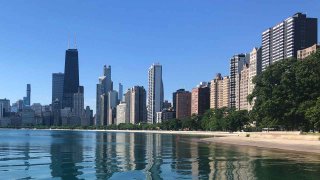
Several northern Chicago suburbs were experiencing unhealthy air conditions as a result of elevated ozone levels Friday, prompting environmental agencies to encourage members of "sensitive groups" to take precautions.
Communities including Waukegan, Gurnee, Wadsworth, Beach Park and Zion saw an Air Quality Index value of 108 Friday afternoon, above the moderate category, which includes values from 50-100, according to the U.S. Environmental Protection Agency's website.
Ozone, which is often referred to as smog, develops in the atmosphere from gases that come out of vehicle tailpipes, smokestacks and other additional sources, the American Lung Association explained on its website.
People with lung diseases such as asthma, children and teens, those 65 years of age and older along with people who routinely exercise for six or more hours a day were advised to take the following steps to reduce exposure:
Feeling out of the loop? We'll catch you up on the Chicago news you need to know. Sign up for the weekly Chicago Catch-Up newsletter here.
- Choose less strenuous activities - like walking instead of running
- Shorten the amount of time you are active outdoors
- Be active outdoors when air quality has improved
Everyone else can enjoy outdoor activities as usual, the EPA stated.
Some evidence suggests that women, those who suffer from obesity and people with low incomes may face higher risks from ozone, although more research is needed to confirm the findings, the ALA said.
Local
During the summer months, some subsequent health problems may be felt immediately, including shortness of breath, wheezing, coughing and asthma attacks.
Elevated ozone levels are expected in both the city of Chicago and portions of
Northwest Indiana Saturday, leading the Indiana Department of Environmental Management to issue an Air Quality Alert beginning at midnight Friday.
The alert, which covers Lake and Porter counties, will remain in effect through midnight Saturday.
IDEM recommended residents take the following steps to help reduce ozone levels:
- Drive less: carpool, use public transportation, walk, bike, or work from home when possible
- Combine errands into one trip
- Avoid refueling your vehicle or using gasoline-powered lawn equipment until after 7 p.m.
- Keep your engine tuned, and don’t let your engine idle (e.g., at a bank or restaurant drive-thru)
- Conserve energy by turning off lights and setting the thermostat to 75 degrees or above



